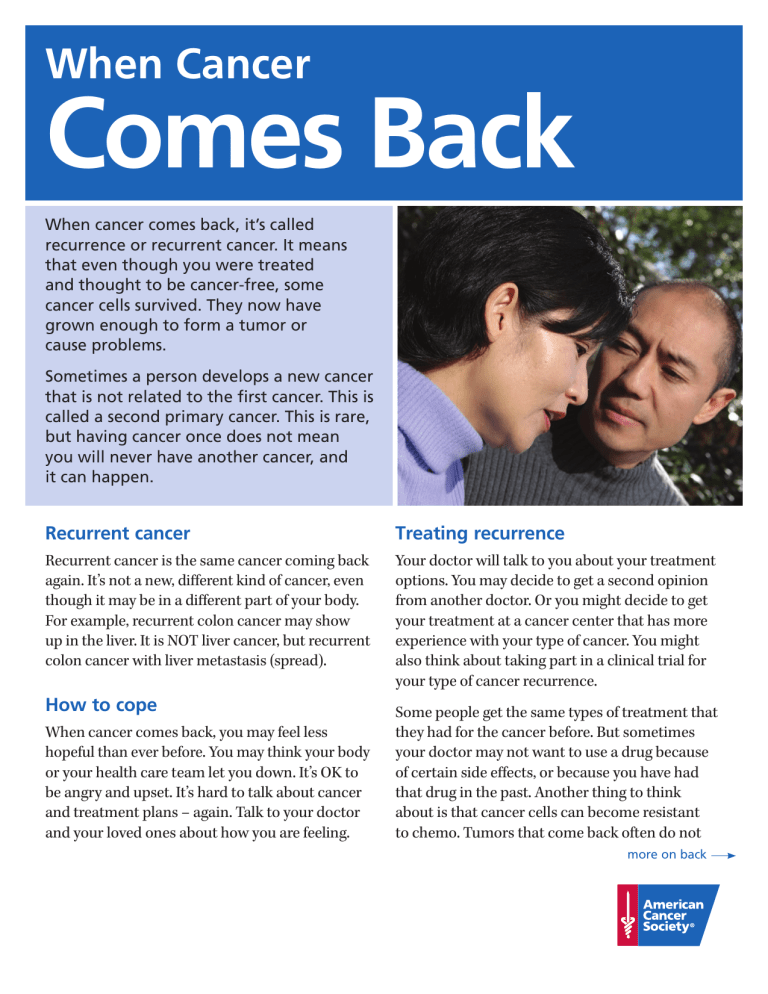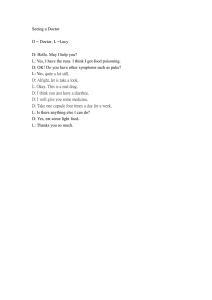When Cancer Comes Back - American Cancer Society

When Cancer
Comes Back
When cancer comes back, it’s called recurrence or recurrent cancer. It means that even though you were treated and thought to be cancer-free, some cancer cells survived. They now have grown enough to form a tumor or cause problems.
Sometimes a person develops a new cancer that is not related to the first cancer. This is called a second primary cancer. This is rare, but having cancer once does not mean you will never have another cancer, and it can happen.
Recurrent cancer
Recurrent cancer is the same cancer coming back again. It’s not a new, different kind of cancer, even though it may be in a different part of your body.
For example, recurrent colon cancer may show up in the liver. It is NOT liver cancer, but recurrent colon cancer with liver metastasis (spread).
How to cope
When cancer comes back, you may feel less hopeful than ever before. You may think your body or your health care team let you down. It’s OK to be angry and upset. It’s hard to talk about cancer and treatment plans – again. Talk to your doctor and your loved ones about how you are feeling.
Treating recurrence
Your doctor will talk to you about your treatment options. You may decide to get a second opinion from another doctor. Or you might decide to get your treatment at a cancer center that has more experience with your type of cancer. You might also think about taking part in a clinical trial for your type of cancer recurrence.
Some people get the same types of treatment that they had for the cancer before. But sometimes your doctor may not want to use a drug because of certain side effects, or because you have had that drug in the past. Another thing to think about is that cancer cells can become resistant to chemo. Tumors that come back often do not more on back
respond to treatment as well as they did the first time. You may need different drugs to kill the cancer cells because they work in a different way.
Ask your doctor why a certain kind of treatment is better. Do you have 2 or 3 treatment options?
Talk to your nurse, doctor, and loved ones about your choices. Only you can make the best decision for you.
Treating cancer as a chronic illness
Cancer may not be a one-time event. Cancer can come back a second and third time. It can even become an ongoing (chronic) illness that never really goes away. Recurrent cancer may not be cured, but it can often be controlled. You need to know that even people who are not cured of cancer may go on living for months or years, even though there may be changes in their lives. For these people, cancer can be much like diabetes or heart disease – a chronic illness that is mostly controlled with treatment.
What happens if treatment stops working?
Sometimes cancer keeps growing during treatment, but another treatment might work.
When a person has had many different treatments that do not stop the cancer, it may mean that it has become resistant to all treatment. At this time, it’s important to weigh the benefits of new treatment against the risks, such as the stress of getting treatment and the side effects that go with it. Everyone has their own way of looking at this.
This will be the toughest time in your battle with cancer – when you have tried everything and it’s just not working anymore. If you want to keep getting treatment to fight your cancer, you will need to think about how likely it is that the treatment will help you. Will it make you feel better? Will it help you live longer? In many cases, your doctor can give you their best guess as to how likely it is that the treatment will help you.
No matter what you decide to do, it’s important that you feel as good as possible. Make sure you are asking for and getting treatment for any symptoms you might have, such as nausea or pain.
Am I going to die?
When cancer comes back it does not mean that you will die, but this is still something you will think about. This can be a hard time for you. Talk with your doctor about your fears and concerns.
Remember that even when you are healthy, it helps to plan for the chance that you could die.
Having hope is important. Your hope for a cure may not be as bright, but there is still hope for good times with family and friends – times that are filled with happiness and meaning.
In a way, pausing at this time in your cancer treatment gives you a chance to refocus on the most important things in your life. Now may be the time to do some of the things you’ve always wanted to do.
Having a cancer recurrence does not put you beyond hope or help; you may be living with a disease that can be treated or controlled. You can learn to live with cancer. And remember that there are nearly 14 million Americans alive today who have had cancer.
For more information, please call us anytime, day or night, at 1-800-227-2345.
Written September 2014
© 2009, American Cancer Society, Inc.
No. 213700-Rev.09/14
Models used for illustrative purposes only.




